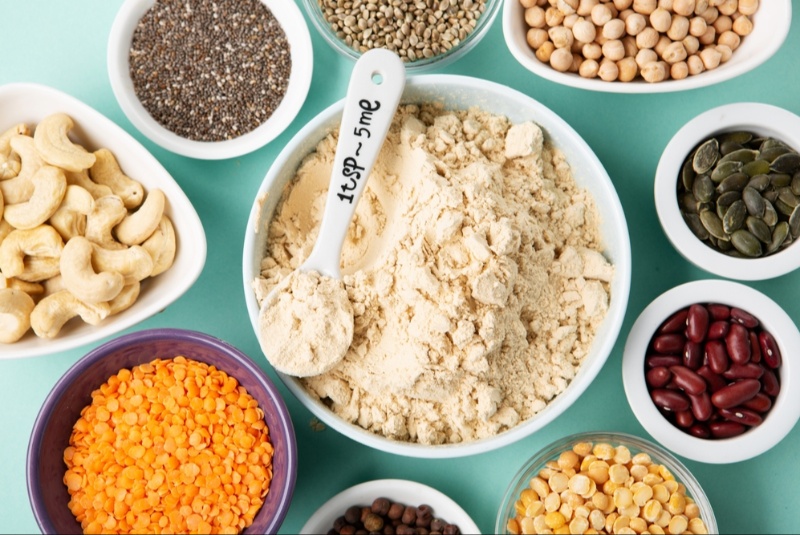As the world becomes more health-conscious and environmentally aware, plant-based protein powders are gaining immense popularity. They are not only a great alternative for vegetarians and vegans but also for anyone looking to reduce their meat consumption. Plant-based proteins are derived from sources like peas, rice, hemp, and soy, offering a sustainable and often hypoallergenic option. This guide explores some of the best plant-based protein powders available in the market, focusing on their nutritional value, taste, mixability, and price.
1. Pea Protein Powder
Pea protein powder, primarily made from yellow split peas, is a favorite among fitness enthusiasts. It’s a complete protein, containing all nine essential amino acids, and is particularly rich in branched-chain amino acids (BCAAs) which are crucial for muscle growth and recovery. Pea protein is also easy to digest and typically free from allergens like gluten and dairy, making it a safe choice for people with food sensitivities.
2. Brown Rice Protein Powder
Brown rice protein is another popular plant-based option. While rice is often considered a carb source, brown rice protein powder is processed to isolate the protein. It’s a good choice for those looking for a protein source that’s low in fat and cholesterol. Brown rice protein is also hypoallergenic and easy on the stomach. However, it’s not a complete protein, so it’s often combined with other plant proteins to ensure a full amino acid profile.
3. Hemp Protein Powder
Hemp protein powder is derived from hemp seeds and is known for its rich nutritional profile. It not only provides protein but also essential fatty acids, fiber, and minerals like iron and magnesium. Hemp protein is also a complete protein, and its nutty taste makes it a flavorful addition to shakes and smoothies. It’s perfect for those looking for a more holistic nutritional supplement.
4. Soy Protein Powder
Soy protein powder is one of the most common plant-based protein powders. It’s a complete protein and a great source of BCAAs. Soy protein supports muscle building and is beneficial for heart health. However, it’s important to choose non-GMO and organic soy protein powders to avoid potential health risks associated with genetically modified organisms.

5. Mixed Plant Protein Powders
Many brands now offer blends of different plant-based proteins. These mixes often combine pea, brown rice, hemp, and other plant proteins to provide a complete amino acid profile. These blends can also mitigate the taste and texture issues that some single-source plant proteins have, offering a balanced flavor and smoother consistency.
Nutritional Considerations
When selecting a plant-based protein powder, it’s essential to look at the nutritional label. Pay attention to the protein content per serving, the amino acid profile, and any added sugars or artificial ingredients. Some powders may also include added vitamins and minerals, which can be a bonus.
Taste and Mixability
The taste and texture of plant-based protein powders can vary significantly. Some may have a gritty texture or a distinct taste that might not appeal to everyone. It’s worth trying samples or small packets before committing to a large tub. Also, consider how well the powder mixes with liquids – some may require a blender for a smooth consistency.
Price Point
Plant-based protein powders can range from moderately priced to quite expensive, depending on the brand and ingredients. While it’s tempting to go for the cheapest option, it’s important to balance cost with quality. Investing in a higher-quality product can offer better taste, texture, and nutritional benefits.
Environmental Impact and Sustainability
One of the major advantages of plant-based protein powders is their lower environmental footprint compared to animal-based proteins. They require less water and land to produce and result in lower greenhouse gas emissions. When choosing a powder, consider the brand’s commitment to sustainability in their sourcing and production processes.
Allergen-Free Options
For those with allergies, plant-based proteins offer excellent alternatives to dairy-based whey or casein proteins. Most plant proteins are naturally gluten-free, dairy-free, and soy-free, but always check the label to be sure, especially if the product is produced in a facility that processes other allergens.
Optimizing Your Nutrition: Exploring Top-Rated Plant-Based Protein Powders for a Healthier Lifestyle
Plant-based protein powders are increasingly becoming the go-to supplement for fitness enthusiasts and health-conscious individuals. These powders, sourced from plants like peas, brown rice, and hemp, offer a sustainable and allergy-friendly alternative to traditional animal-based proteins. They not only cater to the nutritional needs of vegans and vegetarians but also those looking to diversify their protein sources. High-quality plant-based protein powders are designed to deliver not just essential amino acids for muscle repair and growth but also additional nutrients and fibers, enhancing overall health. As the market expands, consumers are presented with a variety of choices, each boasting unique flavors and health benefits. This growing trend underscores the shift towards more plant-centric diets, reflecting a global consciousness for health and environmental sustainability.
Incorporating Plant-Based Proteins into Your Diet
Plant-based protein powders can be easily incorporated into your daily diet. They can be blended into smoothies, mixed into oatmeal or yogurt, or used in baking to boost the protein content of meals and snacks. The versatility of these powders makes them a convenient way to increase protein intake, especially for those with a busy lifestyle.
Choosing the right plant-based protein powder depends on individual dietary needs, taste preferences, and nutritional goals. With the variety of options available, from single-source to blended powders, there is a plant-based protein out there for everyone. These powders offer a sustainable, healthy, and often more digestible alternative to traditional animal-based protein supplements. By considering factors like nutritional content, taste, mixability, price, and sustainability, you can find the perfect plant-based protein powder to complement your diet and support your health and fitness goals.




